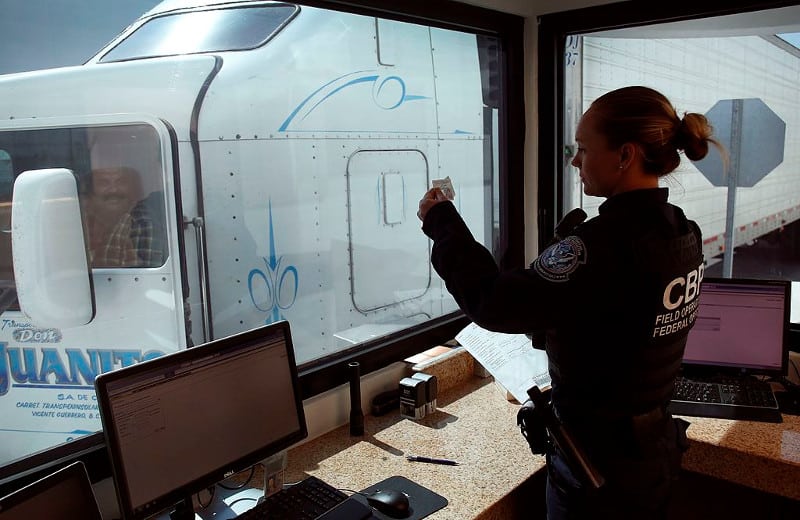
U.S. companies moving freight across the border need additional insurance to cover their Mexican drivers, even if it is only within the border zone
According to the Bureau of Transportation Statistics, trucks moved $700 billion of NAFTA freight in 2016, accounting for 65.5% of all NAFTA trade between Canada, the U.S. and Mexico. About half, $362 billion, was import freight.
In trade with Mexico, trucks hauled 71% of the trade value, with $294.2 billion of imports coming into the U.S. via truck. Texas benefitted the most at $173.7 billion, more than double what California and Michigan saw in 2016.
Much of that Mexican freight moving into the U.S. is being delivered into the commercial border zone, a 50-mile strip on either side of the U.S.-Mexico border where commercial vehicles from both countries can operate freely. It is in this area where you are most likely to find Mexican truck drivers hauling freight on American roads – all perfectly legally.
In fact, several American trucking companies, most of them smaller outfits with fewer than 10 trucks, utilize Mexican citizens to haul goods – mainly fresh produce from both Mexico and points south in Latin America, and auto parts heading for U.S. plants in the heartland. In some cases, those trailers are dropped within the 50-mile commercial zone and hauled throughout America with U.S. truck drivers. Some of the goods remain in that 50-mile region, though, supplying the American economy along the border, while still others are repackaged are warehouses for final destinations in the U.S.
Roberto Vazquez, director of sales for Reliance Partners, explains those Mexican truck drivers can provide an important pipeline for goods heading to the U.S. and vice versa. The U.S. trucking companies using these drivers must get them insured, but due to the lack of competition among insurance providers, it can be more costly than insuring an American driver.
“There’s not a lot of [insurance] companies doing it,” Vazquez says, “but there’s a demand for it.”
One of the misconceptions that has floated around for years is that U.S. trucking companies would like to replace their U.S. citizen drivers with lower-cost Mexican drivers. While there is little proof any of this has occurred in significant numbers, the number of Mexican truck drivers is significant near the border, where American companies take advantage of the ability for Mexican drivers to pull goods out of Mexico. Just like in the U.S., an American driver is typically limited to within 50 miles of the Mexican border. For those companies that choose to utilize Mexican drivers, insuring them becomes a priority.
Vazquez says that any Mexican national driving in the U.S. must meet all U.S. standards that any truck driver would be required to meet. In addition, they must have a Mexican D-1 License, which is the federal version. Mexico also offers state licenses, but drivers holding those are not eligible to drive internationally, meaning they can’t cross the border.
“If it’s within 50 miles of the border, the business qualifies for NAFTA freight,” Vazquez says. “They would have to meet the same requirements as [American drivers], the only difference is it would have to be an international license.
It is also critical what freight the carrier is hauling. The freight must be classified as NAFTA freight. Insurers will not provide coverage for an international driver if he is not hauling NAFTA freight. Vazquez says that having a signed contract to haul the freight is needed. This is important, he says.
“Just because you are located in Laredo, TX, doesn’t mean you qualify,” Vazquez notes.
He says the insurance to cover a Mexican driver can be more expensive due to the lack of competition among insurers and the perceived risk associated with a foreign driver, still, it is a growing market.
“More companies are taking notice of it and more companies are looking to get into international freight,” Vazquez points out, adding that it is not insurance coverage a carrier would acquire without a specific need. “You are paying extra, so you want to make sure you are maximizing it.”
For the carriers who are dependent on moving goods between the two companies, the availability of Mexican drivers is critical, and insuring them even more so.
Stay up-to-date with the latest commentary and insights on FreightTech and the impact to the markets by subscribing.







